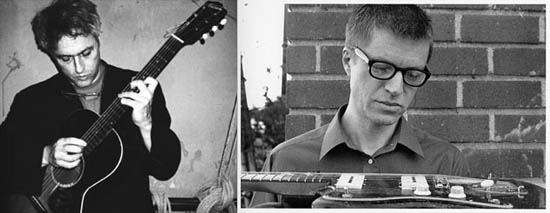Holy Ghosts: Chasin the Masters

Marc Ribot photo by Chico De Luigi; Nels Cline photo by Karen Cline
Marc Ribot & Nels Cline
by Mike Wood
(February 2006)
Freedom hasn't always been used wisely in popular music. Often times, self-indulgence took the place of true experimentation, the music becomes a vehicle for star trips or obscure intellectual pretensions. The freedom of inquiry promised in the 1960's by free jazz, and by the likes of Jimi Hendrix or Red Krayola too often degenerated in to the 4-hour tedium of Grateful Dead shows, or the bloated prog-rock excesses of ELP and Rick Wakeman. In fact, Wakeman's 1975 performances on ice in hockey arenas were probably the last straw for God: he had to invent punk. But the true explorers from the sixties have never compromised; their music today is just as visceral and continues to be both a challenge and embarrassment to those who settled for much less. Recent releases that cover music by such explorers reminds me of how far that spirit has fallen. And it made me wonder if such covers can be seen as spring-boards to further exploration, or are merely tributes to a time of more fearless personal vision.
Free Jazz was the sound of instruments teaching as well as pushing each other moniker given to the late '50's/early '60's work of Ornette Coleman, the late work of John Coltrane, to Albert Ayler and Pharoah Sanders. Its improvisations carried with them a goal of reaching spiritual heights in the chaos: Noise as prayer. That spirit is alive still in the work of David S. Ware, Charles Gayle, William Hooker, Keiji Haino, Nels Cline and Marc Ribot. The two latter have released discs in the last few years that pay tribute and try to extend the work of the masters, with inspiring results.
Nels Cline has been one of the great guitar monsters of the past fifteen years. His aggressive and daring playing has given new meaning to the word "shredding." But not in the sense of self-indulgence; his ferocity has lent itself to subtle as well as frightening excursions. Cline has collaborated with Alan Broadbent on two sets covering the work of bassist/composer Eric Von Essen, as well as work with Von Essen in a chamber music setting. His work with Devon Sarno aims for and reaches the extremes of punk improv. And now, the range of his art has further broadened with his recent work with Wilco, which certainly did benefit from his ideas. It has been his ambition and musical curiosity more so than a distinctive sound that has set him apart from most guitarists. Nels Cline in not only equally at home in jazz, blues classical or rock, but brings a willingness to expand each genre in which he works. He expands sounds histories while working within their framework.
His collaboration with drummer Greg Bendian, a song for song cover of Coltrane's Interstellar Space, uses the basic tunes as a basis for their own improvs, each track not only pointing to new heights, but offering a challenge to try and reach them.
Frightening versions of "Mars" and "Saturn" keep raising the tension and the sublimity until the incredible, trance-like "Jupiter's Lament." Cline and Bendian sound like an orchestra spinning onward and upward, with riffs and beats calling and responding over a landscape few of today's artists would attempt. This record makes you feel exhausted, revived, and more alive than you've been in months. Bendian's recent work with the music of the Mahavishnu Orchestra is another example of building off the past and projecting the experimental ideas of predecessors into the future of new music.
Similarly, Marc Ribot's Spiritual Unity mixes Albert Ayler covers and original improvs inspired by the master, that aims higher; it aims for ritual and ceremony. Ribot has had a similar questing nature in his playing, though he has primarily been known as a New York-based, Knitting Factory type. His work has varied from playing with the Lounge Lizards and John Zorn, recording with Tom Waits, and covering the guitar work of Franz Casseus. He is also the author of probably the greatest record title ever: Yo, I Killed Your God. With a band formed specifically to work out on and continue the spirit of Ayler's music, Ribot expresses the spirit of Ayler originals like "Spirits" and "Bells." While this record is more faithful to the originals, there is a somber tone present here that approaches the mystic.
Which I believe is the idea. Talking about spirituality in music today is dicey, given that spirituality in the broader culture has been hijacked by Fundamentalists, and in music is mostly represented by lame emo bands. But Free Jazz took the search for higher knowledge deadly seriously, as have those who have been influenced by those artists. The recent Cline and Ribot records remind us that it takes commitment and balls to strive for the truly spiritual. The music of the true believers would be impossible to turn into advertisements.
See the Nels Cline website at http://www.nelscline.com